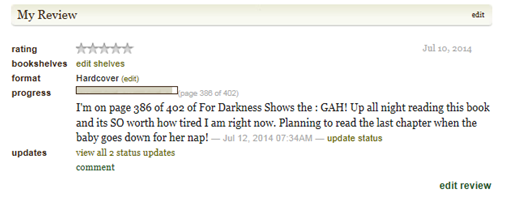Edie Melson's Blog, page 406
July 20, 2014
Weekend Worship—The Writer’s Walk of Faith
For we walk by faith, not by sight. II Corinthians 5:7
 As writers, we have chosen to follow a difficult path. I remember, after a particularly hard week, my husband remarked that he wished I’d chosen another career, something simple—like becoming a movie star.
As writers, we have chosen to follow a difficult path. I remember, after a particularly hard week, my husband remarked that he wished I’d chosen another career, something simple—like becoming a movie star.
His comparison was more appropriate than he realized. Success, for both career choices appears, from the outside at least, to rely on being popular with a lot of people. Reaching the top seems to come and go with the whims of an unknown audience. We struggle and strive for numbers—likes on our Facebook pages, followers on Twitter, and ultimately sales numbers. We seek to please our readers, our publishers, even other writers.
We are word people, caged and captured by the expectation of numbers.(Click to Tweet)
 But when we have chosen this path at God’s calling, our focus needs to be somewhere other than those who will read our words. Our audience is an audience of One, and it is to Him and Him alone that we owe our allegiance. He will dictate, with wisdom far beyond our own, who will read our words and the reach they will have. And I for one, am well pleased to leave my destiny in His capable hands.
But when we have chosen this path at God’s calling, our focus needs to be somewhere other than those who will read our words. Our audience is an audience of One, and it is to Him and Him alone that we owe our allegiance. He will dictate, with wisdom far beyond our own, who will read our words and the reach they will have. And I for one, am well pleased to leave my destiny in His capable hands.
So today I encourage you to seek out the joy of your audience, because I know He is well pleased by your obedience to follow His call. Let Him lavish you with praise and protect you from worry. Leave the numbers to Him and concentrate only on the words.
 As writers, we have chosen to follow a difficult path. I remember, after a particularly hard week, my husband remarked that he wished I’d chosen another career, something simple—like becoming a movie star.
As writers, we have chosen to follow a difficult path. I remember, after a particularly hard week, my husband remarked that he wished I’d chosen another career, something simple—like becoming a movie star. His comparison was more appropriate than he realized. Success, for both career choices appears, from the outside at least, to rely on being popular with a lot of people. Reaching the top seems to come and go with the whims of an unknown audience. We struggle and strive for numbers—likes on our Facebook pages, followers on Twitter, and ultimately sales numbers. We seek to please our readers, our publishers, even other writers.
We are word people, caged and captured by the expectation of numbers.(Click to Tweet)
 But when we have chosen this path at God’s calling, our focus needs to be somewhere other than those who will read our words. Our audience is an audience of One, and it is to Him and Him alone that we owe our allegiance. He will dictate, with wisdom far beyond our own, who will read our words and the reach they will have. And I for one, am well pleased to leave my destiny in His capable hands.
But when we have chosen this path at God’s calling, our focus needs to be somewhere other than those who will read our words. Our audience is an audience of One, and it is to Him and Him alone that we owe our allegiance. He will dictate, with wisdom far beyond our own, who will read our words and the reach they will have. And I for one, am well pleased to leave my destiny in His capable hands. So today I encourage you to seek out the joy of your audience, because I know He is well pleased by your obedience to follow His call. Let Him lavish you with praise and protect you from worry. Leave the numbers to Him and concentrate only on the words.
Published on July 20, 2014 01:00
July 19, 2014
Social Media Image—Chasing Butterflies
Butterflies can be a euphemism for many things, from cool ideas to distractions. No matter what they stand for, we still need to go beyond chasing them. How do you catch those elusive butterflies in your life?
 You can only chase a butterfly for so long... -Jane Yolen
You can only chase a butterfly for so long... -Jane Yolen
Share your thoughts in the comment section below.
I also invite you to use this image any way you like online. Post it to your blog, share it on Facebook, Twitter, Pinterest, anywhere you'd like. All I ask is that you keep it intact, with my website watermark visible.
Don't forget to join the conversation!Blessings,Edie
 You can only chase a butterfly for so long... -Jane Yolen
You can only chase a butterfly for so long... -Jane YolenShare your thoughts in the comment section below.
I also invite you to use this image any way you like online. Post it to your blog, share it on Facebook, Twitter, Pinterest, anywhere you'd like. All I ask is that you keep it intact, with my website watermark visible.
Don't forget to join the conversation!Blessings,Edie
Published on July 19, 2014 01:00
July 18, 2014
Life Lessons—Don’t Let the Don’ts Stop You
by Bruce Brady @bdbrady007
 During a writing class I attended, the instructor stressed that we should write just about anything. She went on to qualify that by saying, “It needs to be believable. You don’t want to write about the moon being made out of cheese.”
During a writing class I attended, the instructor stressed that we should write just about anything. She went on to qualify that by saying, “It needs to be believable. You don’t want to write about the moon being made out of cheese.”
Because my brain works the way it does, I thought why not? I’m not saying the instructor was wrong. It was just a spontaneous remark to stress that readers would not be receptive to the absurd. However, my questioned remained. Why couldn’t I write about the moon being made of cheese?I believe you can write about the moon being made of cheese, or pink horses with purple polka dots, or any number of absurd things, if you write for the right audience. While lovers of romance, thrillers, suspense and mystery may scoff at a such things, children would love the right story about a moon of cheese.
 My point is this, don’t ever let someone’s don’t stop you from writing a story you’re passionate about. Too many times I hear writers quickly dismiss their own story ideas with a, “Nobody would read that.” Perhaps nobody would, but carefully consider the possibilities of your ideas before dismissing them as silly. What if J.K. Rowling quickly dismissed the idea of a boy who lived with abusive relatives would escape their abuse by disappearing into a large column at a train station and traveling to a school of wizardry?
My point is this, don’t ever let someone’s don’t stop you from writing a story you’re passionate about. Too many times I hear writers quickly dismiss their own story ideas with a, “Nobody would read that.” Perhaps nobody would, but carefully consider the possibilities of your ideas before dismissing them as silly. What if J.K. Rowling quickly dismissed the idea of a boy who lived with abusive relatives would escape their abuse by disappearing into a large column at a train station and traveling to a school of wizardry?
Oh, and the moon of cheese story? It’s taken. I’m working on it now. So please think before you dismiss an idea that sticks in your head. Maybe bounce it off of a couple of trusted friends to get their reactions. But at least spend some time thinking about who might read the story. In throwing away any story idea without giving it fair consideration you may be robbing countless people of a pleasurable experience.
Has this ever happened to you? Share your thoughts below in the comments section.
Don't forget to join the conversation!Blessings,Bruce
TWEETABLESDon't let someone else's arbitrary rules keep you from a writing idea! - via @BDBrady007 (Click to Tweet)
Have you let someone's DON'T keep you from exploring a fun writing idea? - via @BDBrady007 (Click to Tweet)
 Bruce Brady is an author, writer and playwright. His work has appeared in Focus on the Family’s Thriving Family, www.ChristianDevotions.us, and on stage. Currently, Bruce is working on a Young Adult Novel about a boy who must deal with the death of his dad, being bullied, and helping his mom through her grief. His first five pages took third place in the ACFW South Carolina Chapter’s “First Five Pages” contest.
Bruce Brady is an author, writer and playwright. His work has appeared in Focus on the Family’s Thriving Family, www.ChristianDevotions.us, and on stage. Currently, Bruce is working on a Young Adult Novel about a boy who must deal with the death of his dad, being bullied, and helping his mom through her grief. His first five pages took third place in the ACFW South Carolina Chapter’s “First Five Pages” contest.
When he’s not writing, Bruce spends time learning from and helping other writers. He serves as Mentor of Word Weavers International’s Online Chapter, and as a member of Cross ‘N’ Pens, The Writer’s Plot, ACFW’s National and South Carolina Chapters.
“My dream is to entertain my readers and give them hope as they travel the rocky road of life.”
Connect with Bruce on his blog, The Write Voyage, Facebook, Twitter, Google+, and Pinterest.
 During a writing class I attended, the instructor stressed that we should write just about anything. She went on to qualify that by saying, “It needs to be believable. You don’t want to write about the moon being made out of cheese.”
During a writing class I attended, the instructor stressed that we should write just about anything. She went on to qualify that by saying, “It needs to be believable. You don’t want to write about the moon being made out of cheese.”Because my brain works the way it does, I thought why not? I’m not saying the instructor was wrong. It was just a spontaneous remark to stress that readers would not be receptive to the absurd. However, my questioned remained. Why couldn’t I write about the moon being made of cheese?I believe you can write about the moon being made of cheese, or pink horses with purple polka dots, or any number of absurd things, if you write for the right audience. While lovers of romance, thrillers, suspense and mystery may scoff at a such things, children would love the right story about a moon of cheese.
 My point is this, don’t ever let someone’s don’t stop you from writing a story you’re passionate about. Too many times I hear writers quickly dismiss their own story ideas with a, “Nobody would read that.” Perhaps nobody would, but carefully consider the possibilities of your ideas before dismissing them as silly. What if J.K. Rowling quickly dismissed the idea of a boy who lived with abusive relatives would escape their abuse by disappearing into a large column at a train station and traveling to a school of wizardry?
My point is this, don’t ever let someone’s don’t stop you from writing a story you’re passionate about. Too many times I hear writers quickly dismiss their own story ideas with a, “Nobody would read that.” Perhaps nobody would, but carefully consider the possibilities of your ideas before dismissing them as silly. What if J.K. Rowling quickly dismissed the idea of a boy who lived with abusive relatives would escape their abuse by disappearing into a large column at a train station and traveling to a school of wizardry?Oh, and the moon of cheese story? It’s taken. I’m working on it now. So please think before you dismiss an idea that sticks in your head. Maybe bounce it off of a couple of trusted friends to get their reactions. But at least spend some time thinking about who might read the story. In throwing away any story idea without giving it fair consideration you may be robbing countless people of a pleasurable experience.
Has this ever happened to you? Share your thoughts below in the comments section.
Don't forget to join the conversation!Blessings,Bruce
TWEETABLESDon't let someone else's arbitrary rules keep you from a writing idea! - via @BDBrady007 (Click to Tweet)
Have you let someone's DON'T keep you from exploring a fun writing idea? - via @BDBrady007 (Click to Tweet)
 Bruce Brady is an author, writer and playwright. His work has appeared in Focus on the Family’s Thriving Family, www.ChristianDevotions.us, and on stage. Currently, Bruce is working on a Young Adult Novel about a boy who must deal with the death of his dad, being bullied, and helping his mom through her grief. His first five pages took third place in the ACFW South Carolina Chapter’s “First Five Pages” contest.
Bruce Brady is an author, writer and playwright. His work has appeared in Focus on the Family’s Thriving Family, www.ChristianDevotions.us, and on stage. Currently, Bruce is working on a Young Adult Novel about a boy who must deal with the death of his dad, being bullied, and helping his mom through her grief. His first five pages took third place in the ACFW South Carolina Chapter’s “First Five Pages” contest.When he’s not writing, Bruce spends time learning from and helping other writers. He serves as Mentor of Word Weavers International’s Online Chapter, and as a member of Cross ‘N’ Pens, The Writer’s Plot, ACFW’s National and South Carolina Chapters.
“My dream is to entertain my readers and give them hope as they travel the rocky road of life.”
Connect with Bruce on his blog, The Write Voyage, Facebook, Twitter, Google+, and Pinterest.
Published on July 18, 2014 01:00
July 17, 2014
Handy Step-By-Step Blog Editing Checklist
by Edie Melson @EdieMelson
 Lately, I’ve notice more and more typos creeping into my blog posts. It’s not a fun thing to admit, but it’s because I’ve become complacent about editing.
Lately, I’ve notice more and more typos creeping into my blog posts. It’s not a fun thing to admit, but it’s because I’ve become complacent about editing.
Oh I could blame it on being busy, or life getting crazy, but the truth is...I’ve gotten sloppy.
It’s easy to do. We’re halfway through the year, things are going well with my blog, and my concentration has been elsewhere. Still no excuse.
So today I’m going back to the basics. I’m posting the checklist I use before I publish a blog. It’s not a long involved process, but it will ensure those annoying typos become much less commonplace.Before I get to the list you should know I compose my blog posts in a word document, with NO formatting. I do this for a couple of reasons.First, it gives me a back-up of everything I post on my blogs.Second, it’s easier to check for misspelled words here rather than in the compose pane of my blog.
Blog Edit Check List 1. I begin the process by looking for misspelled words. First checking for the ones my word processing program underlines in red, then checking some common words that have more than one spelling. Here’s a short list of ones that frequently get by me:Lose vs. loose.Chose vs. choose.Its vs. it’s.There vs. they’re vs. their.Your vs. you’re.
1. I begin the process by looking for misspelled words. First checking for the ones my word processing program underlines in red, then checking some common words that have more than one spelling. Here’s a short list of ones that frequently get by me:Lose vs. loose.Chose vs. choose.Its vs. it’s.There vs. they’re vs. their.Your vs. you’re.
2. At this point, I stop to copy and paste the post into the compose window of my blog. This is when I add the formatting. The reason I wait is because the formatting doesn’t copy and paste accurately. The reason for this due to the code involved with publishing a blog to the web. I also check for places to break up the text with bold, headings, italics and bullet points.
 NOTE: Sometimes, weird formatting accidently gets copied over to my blog and I can’t seem to get rid of it. This could be extra spaces between lines, weird formatting for bullet points, or even odd indentions. If I can’t make the text behave, I have a fool-proof way to tame the text. I highlight the offending paragraph and click on the REMOVE FORMATTING icon at the top of the page. It’s easy to find, it’s a capital T with a red x at the base. It’s universal for all major blogging platforms. Once I click that button, I can add back in the formatting I want.
NOTE: Sometimes, weird formatting accidently gets copied over to my blog and I can’t seem to get rid of it. This could be extra spaces between lines, weird formatting for bullet points, or even odd indentions. If I can’t make the text behave, I have a fool-proof way to tame the text. I highlight the offending paragraph and click on the REMOVE FORMATTING icon at the top of the page. It’s easy to find, it’s a capital T with a red x at the base. It’s universal for all major blogging platforms. Once I click that button, I can add back in the formatting I want.
3. Next I add the photographs to illustrate the post.
4. Now that I have the photos, I go to the preview window to see if the font type is correct (verdana), and all the spacing lines up. Here’s what I’m looking for:I want an extra, blank line separating paragraphs (no indentions allowed).I don't want extra lines anywhere.I make certain the text and the pictures line up well, and there isn’t an odd or short line of text sticking out anywhere around the photos.5. Finally, I return to the compose window and read the entire post out loud. I know it sounds weird, but this is an important step. Our brain uses different pathways when we read something out loud and we’re less likely to see what’s actually on the page. This is when I add any commas or other punctuation marks I may have missed.
These steps won't insure a perfect post every time, but they will cut way back on incidental typos.
Now I'd like to know what you do to insure a clean blog before you hit publish . Any tips you share about your process can help us all get better.
Don't forget to join the conversation!Blessings,Edie
TWEETABLESStruggling with blog post editing? @EdieMelson has a checklist to help knock out the typos! (Click to Tweet)
Get rid of those annoying typos & mistakes in your blog posts with this handy checklist from @EdieMelson (Click to Tweet)
 Lately, I’ve notice more and more typos creeping into my blog posts. It’s not a fun thing to admit, but it’s because I’ve become complacent about editing.
Lately, I’ve notice more and more typos creeping into my blog posts. It’s not a fun thing to admit, but it’s because I’ve become complacent about editing. Oh I could blame it on being busy, or life getting crazy, but the truth is...I’ve gotten sloppy.
It’s easy to do. We’re halfway through the year, things are going well with my blog, and my concentration has been elsewhere. Still no excuse.
So today I’m going back to the basics. I’m posting the checklist I use before I publish a blog. It’s not a long involved process, but it will ensure those annoying typos become much less commonplace.Before I get to the list you should know I compose my blog posts in a word document, with NO formatting. I do this for a couple of reasons.First, it gives me a back-up of everything I post on my blogs.Second, it’s easier to check for misspelled words here rather than in the compose pane of my blog.
Blog Edit Check List
 1. I begin the process by looking for misspelled words. First checking for the ones my word processing program underlines in red, then checking some common words that have more than one spelling. Here’s a short list of ones that frequently get by me:Lose vs. loose.Chose vs. choose.Its vs. it’s.There vs. they’re vs. their.Your vs. you’re.
1. I begin the process by looking for misspelled words. First checking for the ones my word processing program underlines in red, then checking some common words that have more than one spelling. Here’s a short list of ones that frequently get by me:Lose vs. loose.Chose vs. choose.Its vs. it’s.There vs. they’re vs. their.Your vs. you’re.2. At this point, I stop to copy and paste the post into the compose window of my blog. This is when I add the formatting. The reason I wait is because the formatting doesn’t copy and paste accurately. The reason for this due to the code involved with publishing a blog to the web. I also check for places to break up the text with bold, headings, italics and bullet points.
 NOTE: Sometimes, weird formatting accidently gets copied over to my blog and I can’t seem to get rid of it. This could be extra spaces between lines, weird formatting for bullet points, or even odd indentions. If I can’t make the text behave, I have a fool-proof way to tame the text. I highlight the offending paragraph and click on the REMOVE FORMATTING icon at the top of the page. It’s easy to find, it’s a capital T with a red x at the base. It’s universal for all major blogging platforms. Once I click that button, I can add back in the formatting I want.
NOTE: Sometimes, weird formatting accidently gets copied over to my blog and I can’t seem to get rid of it. This could be extra spaces between lines, weird formatting for bullet points, or even odd indentions. If I can’t make the text behave, I have a fool-proof way to tame the text. I highlight the offending paragraph and click on the REMOVE FORMATTING icon at the top of the page. It’s easy to find, it’s a capital T with a red x at the base. It’s universal for all major blogging platforms. Once I click that button, I can add back in the formatting I want.3. Next I add the photographs to illustrate the post.
4. Now that I have the photos, I go to the preview window to see if the font type is correct (verdana), and all the spacing lines up. Here’s what I’m looking for:I want an extra, blank line separating paragraphs (no indentions allowed).I don't want extra lines anywhere.I make certain the text and the pictures line up well, and there isn’t an odd or short line of text sticking out anywhere around the photos.5. Finally, I return to the compose window and read the entire post out loud. I know it sounds weird, but this is an important step. Our brain uses different pathways when we read something out loud and we’re less likely to see what’s actually on the page. This is when I add any commas or other punctuation marks I may have missed.
These steps won't insure a perfect post every time, but they will cut way back on incidental typos.
Now I'd like to know what you do to insure a clean blog before you hit publish . Any tips you share about your process can help us all get better.
Don't forget to join the conversation!Blessings,Edie
TWEETABLESStruggling with blog post editing? @EdieMelson has a checklist to help knock out the typos! (Click to Tweet)
Get rid of those annoying typos & mistakes in your blog posts with this handy checklist from @EdieMelson (Click to Tweet)
Published on July 17, 2014 01:00
July 16, 2014
8 Reasons to Write Something RIGHT Now!
by Edie Melson @EdieMelson
 We writers tend to be an odd lot. We obsess about learning to write better. We hang out with writers online and in person. We buy books on How to Write, How to Write Better and How to Sell What We Write.
We writers tend to be an odd lot. We obsess about learning to write better. We hang out with writers online and in person. We buy books on How to Write, How to Write Better and How to Sell What We Write.
But we do almost anything we can to avoid the actual act of writing. Nothing shuts down a writer quicker than a blank page and/or a blinking cursor.
We comfort our guilt-ridden internal writer with the promise of writing whenThat closet is clean.The kitchen is organized.The laundry is done.Facebook is checked one last time.Dinner is cooked.Groceries are bought.You get the idea.
Truthfully, the longer we postpone sitting down and writing, the harder it gets. Avoidance gives volume to those nasty little voices that live in a writer’s head. Voices that say:You’re not good enough.No one will ever read this.You’ll never get published.No one will ever take you seriously.You’ll never sell anything.You know. You’ve heard those voices.
Today I’d like to share 8 reasons to write something RIGHT now.
 1. You’re not getting any younger. I know, it’s a cruel truth to begin with. But it doesn’t matter how young (or old) you are, time marches on.
1. You’re not getting any younger. I know, it’s a cruel truth to begin with. But it doesn’t matter how young (or old) you are, time marches on.
2. It won’t get any easier to start, but it WILL get easier once you begin. The hurdle is the starting. And it’s a hurdle that has to be surmounted every single day of your writing life. Beginning rarely gets any easier.
3. If you don’t start, you’re already a failure and the voices have won. I hear a lot of writers say that if they don’t start (or don’t submit) they won’t fail. That’s a lie. If you won’t start, you’ve already failed.
4. As a writer, NOT writing will hurt you. I’ve seen writers deal with depression, anxiety and other issues that immediately disappeared when they sat down and began to write.
5. Practice makes perfect. There’s only so much improvement you can make by learning about writing. It’s time to put what you know into practice.
 6. Only writing makes you a writer. Talking/Learning about it doesn’t really count.
6. Only writing makes you a writer. Talking/Learning about it doesn’t really count.
7. What you have to share through the written word matters. Yes, this applies to everyone. We all have things to contribute to the lives of others. The way a writer does this is through the written word. So get on with it, someone needs to read what you have to say.
8. If you don’t, you’ll always regret it. I’ve never met a writer who regretted writing, but I’ve met plenty who regretted NOT writing.
It doesn’t matter if I’m working on a book, a blog post, or something else. I have to remind myself about these things almost every time I sit down to write. We all fight the idea that we don’t have a contribution to make that’s worth the effort.
What about you? Please add to the list of reasons to write, RIGHT now. We’re all stronger together.
Don’t forget to join the conversation!Blessings,Edie
TWEETABLESQuit Putting it off - @EdieMelson shares 8 Reasons to #Write Something RIGHT Now! (Click to Tweet)
Intimidated by the blank page/blinking curser? @EdieMelson has 8 Reasons to Write Something RIGHT Now (Click to Tweet)
 We writers tend to be an odd lot. We obsess about learning to write better. We hang out with writers online and in person. We buy books on How to Write, How to Write Better and How to Sell What We Write.
We writers tend to be an odd lot. We obsess about learning to write better. We hang out with writers online and in person. We buy books on How to Write, How to Write Better and How to Sell What We Write. But we do almost anything we can to avoid the actual act of writing. Nothing shuts down a writer quicker than a blank page and/or a blinking cursor.
We comfort our guilt-ridden internal writer with the promise of writing whenThat closet is clean.The kitchen is organized.The laundry is done.Facebook is checked one last time.Dinner is cooked.Groceries are bought.You get the idea.
Truthfully, the longer we postpone sitting down and writing, the harder it gets. Avoidance gives volume to those nasty little voices that live in a writer’s head. Voices that say:You’re not good enough.No one will ever read this.You’ll never get published.No one will ever take you seriously.You’ll never sell anything.You know. You’ve heard those voices.
Today I’d like to share 8 reasons to write something RIGHT now.
 1. You’re not getting any younger. I know, it’s a cruel truth to begin with. But it doesn’t matter how young (or old) you are, time marches on.
1. You’re not getting any younger. I know, it’s a cruel truth to begin with. But it doesn’t matter how young (or old) you are, time marches on. 2. It won’t get any easier to start, but it WILL get easier once you begin. The hurdle is the starting. And it’s a hurdle that has to be surmounted every single day of your writing life. Beginning rarely gets any easier.
3. If you don’t start, you’re already a failure and the voices have won. I hear a lot of writers say that if they don’t start (or don’t submit) they won’t fail. That’s a lie. If you won’t start, you’ve already failed.
4. As a writer, NOT writing will hurt you. I’ve seen writers deal with depression, anxiety and other issues that immediately disappeared when they sat down and began to write.
5. Practice makes perfect. There’s only so much improvement you can make by learning about writing. It’s time to put what you know into practice.
 6. Only writing makes you a writer. Talking/Learning about it doesn’t really count.
6. Only writing makes you a writer. Talking/Learning about it doesn’t really count. 7. What you have to share through the written word matters. Yes, this applies to everyone. We all have things to contribute to the lives of others. The way a writer does this is through the written word. So get on with it, someone needs to read what you have to say.
8. If you don’t, you’ll always regret it. I’ve never met a writer who regretted writing, but I’ve met plenty who regretted NOT writing.
It doesn’t matter if I’m working on a book, a blog post, or something else. I have to remind myself about these things almost every time I sit down to write. We all fight the idea that we don’t have a contribution to make that’s worth the effort.
What about you? Please add to the list of reasons to write, RIGHT now. We’re all stronger together.
Don’t forget to join the conversation!Blessings,Edie
TWEETABLESQuit Putting it off - @EdieMelson shares 8 Reasons to #Write Something RIGHT Now! (Click to Tweet)
Intimidated by the blank page/blinking curser? @EdieMelson has 8 Reasons to Write Something RIGHT Now (Click to Tweet)
Published on July 16, 2014 01:00
July 15, 2014
Indie Tuesday—What To Do With Goodreads
 Jessica Keller @AuthorKeller here: Confession time. Goodreads used to terrify me. Especially as an author. I couldn’t figure out how to interact on it and felt overwhelmed the first time I signed in. Avid Goodreads users have told me that authors can really get themselves into trouble by using Goodreads incorrectly for promo—which made me shy away from it even more. But no longer. My friend, critique partner, and David C. Cook author, Amanda , taught me what to do with Goodreads and now I’m loving my time there. You can too!
Jessica Keller @AuthorKeller here: Confession time. Goodreads used to terrify me. Especially as an author. I couldn’t figure out how to interact on it and felt overwhelmed the first time I signed in. Avid Goodreads users have told me that authors can really get themselves into trouble by using Goodreads incorrectly for promo—which made me shy away from it even more. But no longer. My friend, critique partner, and David C. Cook author, Amanda , taught me what to do with Goodreads and now I’m loving my time there. You can too!What to Do With Goodreads
 by Amanda G. Stevens @AmandaGStevens
by Amanda G. Stevens @AmandaGStevens Do you fear that you have nothing to add to the Endless Conversation of social media? If so, Goodreads might be a great place for you to start. Here, the topic has been predetermined for you. Unlike Tumblr and Facebook, Goodreads is not limited to an age demographic. Young and old gather here, united by a common love of books. What author doesn’t love to talk about books?
Below are some valuable ways to use your time on Goodreads, as well as some related caveats. (And each “don’t” below is based on behavior I have observed from authors, both traditionally and indie published. I wouldn’t make this up.)
1) Join a group. Several, if you can manage them, but like everything else in social media, ’tis better to invest deeply than to invest broadly. Find a group that reads the kind of fiction you write. Jump in and start talking about books. Other people’s books, not yours. You are not a salesperson here; you are a reader.
2) Many Goodreads groups have one thread where authors are invited to self-promote. By all means, post here! Share your passion for your book! Give readers the back cover blurb, a link to the book’s Goodreads page, and a few sentences about why this story burns so brightly in your heart.
3) Join a group/buddy read. (My Goodreads group does both of these.) Again, this is an opportunity for you to connect with readers of similar taste. Long-distance book club—what a fun way to spend social media time.

4) Increase your book’s visibility with Listopia. Search for applicable lists; specific is better. You’re more likely to stand out on “Amish Romance 2014” or “Christian Allegorical Fantasy” than on “Christian Fiction 2014.” (But by all means, go ahead and vote your book onto all three of those. I mean, if your book is an Amish allegorical fantasy.) Lists are only useful, however, if you’re not the only one voting for your book. One or two votes won’t get you high enough on the list to be worth it, but five or ten, believe it or not (depending on the list), can make a difference. Draft the most enthusiastic of your “tribe” for this task. Keep in mind that list voting shows up on your Goodreads profile permanently. Don’t vote your book onto “Books Every Person Should Read At Least Once” or “Deserves To Be A Movie.” (As I said, I’m not making this stuff up.)

5) Rate books! Review books! This is the fun stuff (if, like me, you enjoy writing reviews). Remind people you exist by updating your progress and posting a short comment as you read. Do not—please, do not—rate your own books. Even if you add a review to the effect of, “I know I’m biased, but I hope you all enjoy reading it as much as I enjoyed writing it” … even then, rating your own books comes across as unprofessional and/or self-absorbed. Just don’t.
 6) Give away your book! Goodreads has a function for authors to do this; you can link to it in your other social media, choose how long to run the giveaway, and choose how many copies you want to offer. In addition, contact the moderator of any Goodreads group in which you’re active, and offer to give away copies there. My Goodreads group does monthly contests and pulls random winners from the participants.
6) Give away your book! Goodreads has a function for authors to do this; you can link to it in your other social media, choose how long to run the giveaway, and choose how many copies you want to offer. In addition, contact the moderator of any Goodreads group in which you’re active, and offer to give away copies there. My Goodreads group does monthly contests and pulls random winners from the participants. 7) The home page of Goodreads shows your friends’ latest updates. Be friends with strangers who read the genres you read and write. If they’re reading a book you enjoyed, comment on their progress. Ask if they like the book and why/why not.
In short, Goodreads is about utilizing your love of books to build common ground with people you’d never otherwise meet. It is not about self-promotion. Be visible, be professional, and be generous. You’ll find that book lovers are a great group of people on which to focus your time, and along the way you’re likely to enjoy yourself. After all, you’re a book lover, too, right?
TWEETABLES Seven easy ways Authors can use #Goodreads to connect with readers @AmandaGStevens #IndieTuesday #publishing (Click to Tweet!) @AmandaGStevens shares how #Goodreads can be an author's best friend #IndieTuesday #publishing #authors (Click to Tweet!)
 As a child, Amanda G. Stevens disparaged Mary Poppins and Stuart Little because they could never happen. Now, she writes speculative fiction. She holds a Bachelor of Science degree in English and has taught literature and composition to home-school students. She lives in Michigan and loves books, film, music, and white cheddar popcorn. Amanda’s first novel, Seek and Hide, will be available September 15, 2014 from David C Cook.
As a child, Amanda G. Stevens disparaged Mary Poppins and Stuart Little because they could never happen. Now, she writes speculative fiction. She holds a Bachelor of Science degree in English and has taught literature and composition to home-school students. She lives in Michigan and loves books, film, music, and white cheddar popcorn. Amanda’s first novel, Seek and Hide, will be available September 15, 2014 from David C Cook.
Published on July 15, 2014 00:00
July 14, 2014
Social Media Monday—This Author is Waving Goodbye to Facebook
by Edie Melson @EdieMelson
 No, I don’t think Facebook is going anywhere—yet.
No, I don’t think Facebook is going anywhere—yet.
But I am.
I’m tired of wasting time and energy with this clunky and frustrating social network. Facebook has become it’s own worst enemy, working at cross purposes and driving away users.The Downward SpiralWhen Facebook started, it was a way to stay connected with the people and things we were interested in. I had my list of friends and I had control over what I saw in my newsfeed.
Back then, everything my friends posted on Facebook showed up on my newsfeed, in an orderly, relevant fashion. If someone posted something I didn’t care to see I had a choice of how to deal with it. I could do nothing and ignore the post.I could hide that particular post.I could hide that particular friend.I could unfriend that person.
The control rested with me.
 The same was true with the businesses I followed. If I wanted to follow a business or a professional page, the posts from that also showed up. If the page irritated me, I had the same options.
The same was true with the businesses I followed. If I wanted to follow a business or a professional page, the posts from that also showed up. If the page irritated me, I had the same options.
I didn’t matter whether I interacted with the person or the page, what they posted showed up. That worked good for me, because I don’t interact with everyone or everything I find valuable on Facebook.
But this, in my humble opinion, is where Facebook began its downward slide into self-destruction. They began to judge the value of things by what posts I interacted with. There’s so much wrong with that simple premise it’s hard to know where to start.
Here’s what I mean. I like to keep up with a lot of hard-core marketing pages. I read to stay abreast with what’s going on in the field of social media. It’s a good foundation from which to give advice to writers—but most of these types of FB updates wouldn’t be something my friends and followers find valuable, so I don’t interact with those posts much.
For instance, I follow Social Media Examiner. But they’re a site I don’t interact with much. The other day I realized I hadn’t seen much from them in my FB feed. I searched for their page and they were still there. But because FB judged my interest by my interaction, they never showed up in my feed. I visited their page, clicked on the arrow beside the LIKED tab and clicked on NOTIFICATIONS. Today that means that all their updates should show up in my newsfeed.
But what about the new option to Boost a post—isn’t that valuable?
Um…not so much.
First let me explain something about the Facebook Edgerank. This is the algorithm that determines what shows up in your FB newsfeed. One of the elements that determines how many people see a post on FB, is how popular the post is. The more people who Like it, Share it and Comment on it, the larger number people get to see it.
Boosting a post isn’t a way to get around this. Yes, you can pay to boost a post and reach a lot of people, but that boost doesn’t give you a leg up on the next thing you post. You start over at zero and the algorithm again determines who sees the post. To repeat the reach of your boosted post, you must pay again to boost the post.
Bottom LineLet’s compare this new paradigm of Facebook with other social media networks. Here’s what happens when I post something on FB versus Twitter and Google+. I think the numbers speak for themselves. Facebook: the last 7 posts I put on my FB page garnered me an average of 46 views. That’s out of 500+ Likes on that page. I had a net gain of 5 new LikesTwitter: the last 7 posts I shared on Twitter went out to all 13,000+ Twitter followers, as well as anyone who searched for the hashtags I had within those posts. I had a net gain of 56 new followersGoogle+: the last 7 posts I shared on my Google+ page went out to all of 748 followers and all those who searched for the hashtags I had within those posts. I had a net gain of 26 new followers.
Facebook: the last 7 posts I put on my FB page garnered me an average of 46 views. That’s out of 500+ Likes on that page. I had a net gain of 5 new LikesTwitter: the last 7 posts I shared on Twitter went out to all 13,000+ Twitter followers, as well as anyone who searched for the hashtags I had within those posts. I had a net gain of 56 new followersGoogle+: the last 7 posts I shared on my Google+ page went out to all of 748 followers and all those who searched for the hashtags I had within those posts. I had a net gain of 26 new followers.
Once upon a time I recommended authors have a professional page, to reach readers. Now, an author page has become a liability. For the vast majority, it’s nothing but a black hole of time-sucking frustration.
Some of you still have success with your Facebook page. But almost 100 percent of those were already flourishing communities before the Edgerank Algorithm was instituted. For those of you with FB success, don’t change or jump ship. Stick with what’s working.
I still intend to keep my personal profile active on Facebook. I’m using it as a professional page and it’s working fairly well. It’s clunky, but doable. Here’s a post on how to do what I’ve done by Adding a Follow Button to Your Facebook Personal Profile.
For the rest of us, here’s my recommendation, cut your losses and run. Invest in what works, don’t try to squeeze success from a dried-up network.
Now it’s your turn. Share your thoughts, questions and frustrations with Facebook in the comments section below.
Don’t forget to join the conversation!Blessings,
Edie
TWEETABLESHere's why #socialmedia mentor @EdieMelson is waving goodbye to the frustration of #Facebook (Click to Tweet)
Sick & tired of fighting the frustration of Facebook? #SocialMedia mentor @EdieMelson, "Wave goodbye!" (Click to Tweet)
 No, I don’t think Facebook is going anywhere—yet.
No, I don’t think Facebook is going anywhere—yet. But I am.
I’m tired of wasting time and energy with this clunky and frustrating social network. Facebook has become it’s own worst enemy, working at cross purposes and driving away users.The Downward SpiralWhen Facebook started, it was a way to stay connected with the people and things we were interested in. I had my list of friends and I had control over what I saw in my newsfeed.
Back then, everything my friends posted on Facebook showed up on my newsfeed, in an orderly, relevant fashion. If someone posted something I didn’t care to see I had a choice of how to deal with it. I could do nothing and ignore the post.I could hide that particular post.I could hide that particular friend.I could unfriend that person.
The control rested with me.
 The same was true with the businesses I followed. If I wanted to follow a business or a professional page, the posts from that also showed up. If the page irritated me, I had the same options.
The same was true with the businesses I followed. If I wanted to follow a business or a professional page, the posts from that also showed up. If the page irritated me, I had the same options.I didn’t matter whether I interacted with the person or the page, what they posted showed up. That worked good for me, because I don’t interact with everyone or everything I find valuable on Facebook.
But this, in my humble opinion, is where Facebook began its downward slide into self-destruction. They began to judge the value of things by what posts I interacted with. There’s so much wrong with that simple premise it’s hard to know where to start.
Here’s what I mean. I like to keep up with a lot of hard-core marketing pages. I read to stay abreast with what’s going on in the field of social media. It’s a good foundation from which to give advice to writers—but most of these types of FB updates wouldn’t be something my friends and followers find valuable, so I don’t interact with those posts much.
For instance, I follow Social Media Examiner. But they’re a site I don’t interact with much. The other day I realized I hadn’t seen much from them in my FB feed. I searched for their page and they were still there. But because FB judged my interest by my interaction, they never showed up in my feed. I visited their page, clicked on the arrow beside the LIKED tab and clicked on NOTIFICATIONS. Today that means that all their updates should show up in my newsfeed.
But what about the new option to Boost a post—isn’t that valuable?
Um…not so much.
First let me explain something about the Facebook Edgerank. This is the algorithm that determines what shows up in your FB newsfeed. One of the elements that determines how many people see a post on FB, is how popular the post is. The more people who Like it, Share it and Comment on it, the larger number people get to see it.
Boosting a post isn’t a way to get around this. Yes, you can pay to boost a post and reach a lot of people, but that boost doesn’t give you a leg up on the next thing you post. You start over at zero and the algorithm again determines who sees the post. To repeat the reach of your boosted post, you must pay again to boost the post.
Bottom LineLet’s compare this new paradigm of Facebook with other social media networks. Here’s what happens when I post something on FB versus Twitter and Google+. I think the numbers speak for themselves.
 Facebook: the last 7 posts I put on my FB page garnered me an average of 46 views. That’s out of 500+ Likes on that page. I had a net gain of 5 new LikesTwitter: the last 7 posts I shared on Twitter went out to all 13,000+ Twitter followers, as well as anyone who searched for the hashtags I had within those posts. I had a net gain of 56 new followersGoogle+: the last 7 posts I shared on my Google+ page went out to all of 748 followers and all those who searched for the hashtags I had within those posts. I had a net gain of 26 new followers.
Facebook: the last 7 posts I put on my FB page garnered me an average of 46 views. That’s out of 500+ Likes on that page. I had a net gain of 5 new LikesTwitter: the last 7 posts I shared on Twitter went out to all 13,000+ Twitter followers, as well as anyone who searched for the hashtags I had within those posts. I had a net gain of 56 new followersGoogle+: the last 7 posts I shared on my Google+ page went out to all of 748 followers and all those who searched for the hashtags I had within those posts. I had a net gain of 26 new followers.Once upon a time I recommended authors have a professional page, to reach readers. Now, an author page has become a liability. For the vast majority, it’s nothing but a black hole of time-sucking frustration.
Some of you still have success with your Facebook page. But almost 100 percent of those were already flourishing communities before the Edgerank Algorithm was instituted. For those of you with FB success, don’t change or jump ship. Stick with what’s working.
I still intend to keep my personal profile active on Facebook. I’m using it as a professional page and it’s working fairly well. It’s clunky, but doable. Here’s a post on how to do what I’ve done by Adding a Follow Button to Your Facebook Personal Profile.
For the rest of us, here’s my recommendation, cut your losses and run. Invest in what works, don’t try to squeeze success from a dried-up network.
Now it’s your turn. Share your thoughts, questions and frustrations with Facebook in the comments section below.
Don’t forget to join the conversation!Blessings,
Edie
TWEETABLESHere's why #socialmedia mentor @EdieMelson is waving goodbye to the frustration of #Facebook (Click to Tweet)
Sick & tired of fighting the frustration of Facebook? #SocialMedia mentor @EdieMelson, "Wave goodbye!" (Click to Tweet)
Published on July 14, 2014 01:00
July 13, 2014
Weekend Worship—The Post of Ambassador
Therefore, we are ambassadors for Christ, certain that God is appealing through us. 2 Corinthians 5:20
 I’m constantly amazed at how God chooses to use me in the work He’s doing in this world. It’s humbling and terrifying at the same time.
I’m constantly amazed at how God chooses to use me in the work He’s doing in this world. It’s humbling and terrifying at the same time.
I’ve been looking at this verse, trying to wrap my mind around what being an ambassador for Christ looks like when it’s lived out. I think this verse is particularly applicable to those of us who write from Christian world view. As I studied the parallels between the role of ambassadors here and our role as believers, I was struck by the lessons hidden there.
The first thing that struck me was the fact that, here in the physical world, those who are ambassadors don’t live in their own countries. They are strangers in a strange land. That’s also true of believers. This world is our temporary home, even though our time here can sometimes seems endless.Next, I realized that ambassadors are appointed, not elected. They haven’t campaigned for their position, it’s a gift of responsibility. We are also appointed, chosen by God and elevated to the position of spiritual ambassador. It’s not because we’re better than anyone else, it’s simply a gift of grace.Finally, earthly ambassadors don’t get to choose their country of service. That too is the choice of the one they serve. As believers, we have each been chosen to serve where God places us.
 As a writer, I’ve often chaffed at this restriction. I wanted to do big things for God. I had a definite opinion about where and how I wanted to live out my dream.
As a writer, I’ve often chaffed at this restriction. I wanted to do big things for God. I had a definite opinion about where and how I wanted to live out my dream.
Thank goodness God had other plans.
It turns out, when I look back, His plans were much better. They went farther and deeper than I ever imagined. For some reason, we writers tend to think too small. And we assume that if God doesn’t do things our way, the outcome will be just a shadow of what we want. That couldn’t be farther from the truth.
So let me ask you this, how has God surprised you with the way He’s used your writing. This isn’t a time to be shy. It’s not bragging to share what God has done, at least it’s not bragging on ourselves. So let’s take a minute to brag on God.
 I’m constantly amazed at how God chooses to use me in the work He’s doing in this world. It’s humbling and terrifying at the same time.
I’m constantly amazed at how God chooses to use me in the work He’s doing in this world. It’s humbling and terrifying at the same time. I’ve been looking at this verse, trying to wrap my mind around what being an ambassador for Christ looks like when it’s lived out. I think this verse is particularly applicable to those of us who write from Christian world view. As I studied the parallels between the role of ambassadors here and our role as believers, I was struck by the lessons hidden there.
The first thing that struck me was the fact that, here in the physical world, those who are ambassadors don’t live in their own countries. They are strangers in a strange land. That’s also true of believers. This world is our temporary home, even though our time here can sometimes seems endless.Next, I realized that ambassadors are appointed, not elected. They haven’t campaigned for their position, it’s a gift of responsibility. We are also appointed, chosen by God and elevated to the position of spiritual ambassador. It’s not because we’re better than anyone else, it’s simply a gift of grace.Finally, earthly ambassadors don’t get to choose their country of service. That too is the choice of the one they serve. As believers, we have each been chosen to serve where God places us.
 As a writer, I’ve often chaffed at this restriction. I wanted to do big things for God. I had a definite opinion about where and how I wanted to live out my dream.
As a writer, I’ve often chaffed at this restriction. I wanted to do big things for God. I had a definite opinion about where and how I wanted to live out my dream. Thank goodness God had other plans.
It turns out, when I look back, His plans were much better. They went farther and deeper than I ever imagined. For some reason, we writers tend to think too small. And we assume that if God doesn’t do things our way, the outcome will be just a shadow of what we want. That couldn’t be farther from the truth.
So let me ask you this, how has God surprised you with the way He’s used your writing. This isn’t a time to be shy. It’s not bragging to share what God has done, at least it’s not bragging on ourselves. So let’s take a minute to brag on God.
Published on July 13, 2014 01:00
July 12, 2014
Social Media Image—Favorite Places
Where are some of your favorite places to rest and renew?
 "I like this place and could willingly waste my time in it." William Shakespeare
"I like this place and could willingly waste my time in it." William Shakespeare
(This picture was taken on a recent trip to the Biltmore Estate in Asheville, NC)Share your thoughts in the comment section below.
I also invite you to use this image any way you like online. Post it to your blog, share it on Facebook, Twitter, Pinterest, anywhere you'd like. All I ask is that you keep it intact, with my website watermark visible.
Don't forget to join the conversation!Blessings,Edie
 "I like this place and could willingly waste my time in it." William Shakespeare
"I like this place and could willingly waste my time in it." William Shakespeare(This picture was taken on a recent trip to the Biltmore Estate in Asheville, NC)Share your thoughts in the comment section below.
I also invite you to use this image any way you like online. Post it to your blog, share it on Facebook, Twitter, Pinterest, anywhere you'd like. All I ask is that you keep it intact, with my website watermark visible.
Don't forget to join the conversation!Blessings,Edie
Published on July 12, 2014 01:00
July 11, 2014
Pray and Work – A Writer’s Two-fold Mandate
By Lori Hatcher
 “How’s your writing going?” I asked a woman at a recent writers’ conference.
“How’s your writing going?” I asked a woman at a recent writers’ conference.
“Not very well,” she said. “I’m very discouraged.”
“The last time we talked, you were working on a new article. How did that turn out?” I asked, probing a little deeper.
“I haven’t worked on it in months,” she said with a sigh. “I sent out three queries and didn’t hear back from any of them. I was going to look into writing for our church newsletter, but I just haven’t gotten around to it.” She took a deep breath and blew it out in frustration, flinging her hands in the air. “I just can’t seem to get any breaks. I don’t understand it, because I believe God’s called me to write.”
 Nehemiah was a man who also believed God had called him. Charged with the task of rebuilding the wall around Jerusalem, he faced a formidable job. The physical project was demanding, but the psychological challenge was even greater. Governors from the surrounding area harassed, intimidated, and threatened him and his workers, deliberately trying to derail the work.
Nehemiah was a man who also believed God had called him. Charged with the task of rebuilding the wall around Jerusalem, he faced a formidable job. The physical project was demanding, but the psychological challenge was even greater. Governors from the surrounding area harassed, intimidated, and threatened him and his workers, deliberately trying to derail the work.
Like my writer friend, Nehemiah prayed about the situation all the time.
“Hear us, O our God, for we are despised,” he prayed. “Turn their insults back on their own heads. Give them over as plunder in a land of captivity. Do not cover up their guilt or blot out their sins from your sight, for they have thrown insults in the face of the builders” (Neh. 4:4-5).
But then Nehemiah went to work.
“So we rebuilt the wall till all of it reached half its height, for the people worked with all their heart” (v. 6).
Later in the chapter, threatened and harassed, he prayed again. And then he went to work.
“But we prayed to our God and posteda guard day and night to meet this threat” (v. 9).
 I’ve been on a writing journey for years now. My official career began when I submitted the first devotional piece to the Christian magazine I now serve as editor. One piece led to another, which opened the door for assigned pieces. As my string of articles grew, I spent hours combing the Christian Writers’ Market Guide for suitable publications that might be interested in my work. I attended writers’ conferences to learn the craft and network with other writers and editors. I started my blog, knowing that the commitment to post twice a week would keep me accountable to write regularly. To date I’ve written 436 blog posts.
I’ve been on a writing journey for years now. My official career began when I submitted the first devotional piece to the Christian magazine I now serve as editor. One piece led to another, which opened the door for assigned pieces. As my string of articles grew, I spent hours combing the Christian Writers’ Market Guide for suitable publications that might be interested in my work. I attended writers’ conferences to learn the craft and network with other writers and editors. I started my blog, knowing that the commitment to post twice a week would keep me accountable to write regularly. To date I’ve written 436 blog posts.
Today I pulled out my writing notebook. I use it to log articles I’ve written, magazines and websites I’ve submitted to, and queries I’ve sent out. When I receive a positive response to an article, I highlight the entry. When I receive a “no,” I note that too.
The back of my folder has a special pocket for rejection letters. In it I have letters from nine editors who passed on the opportunity to publish my devotional book. Also in the back of my folder is a skinny pocket that holds the acceptance letter and contract from Lighthouse Publishing of the Carolinas, the company that will publish my second devotional book, Hungry for God . . . Starving for Time in November.
Along the way I’ve prayed a lot about my writing journey. I’ve sought God’s face, often with tears, asking for clarity and direction. When I stop talking long enough to listen, I usually hear his voice. Sometimes he gives me an idea for an article, a resource to pursue, or a contact to help me along the way. Other times he gives me the desire and perseverance to keep on working.
Nehemiah prayed. And then he worked.
So should we.
How do you move forward when you're waiting for a definitive answer from God? Share your thoughts below so we can all learn together.
Don't forget to join the conversation!
Blessings,
Lori
TWEETABLESPray and Work—A Writer's Two-fold Mandate - thoughts from @LoriHatcher2 on @EdieMelson (Click to Tweet)
Praying for direction with our writing is great, but like Nehemiah, we also need to be moving forward in faith (Click to Tweet)
 Lori Hatcher knows what it’s like to be busy. And what it’s like to struggle to make time for God. On her blog
, Hungry for God…Starving for Time
, she shares 5-minute devotions for busy women. Like a spiritual power bar, it’s the nutrition women need to get through the day. A Yankee transplant living in Columbia, South Carolina, she uses her speaking and writing ministry to equip and empower women. Her second devotional book, Hungry for God, will launch in November.
Lori Hatcher knows what it’s like to be busy. And what it’s like to struggle to make time for God. On her blog
, Hungry for God…Starving for Time
, she shares 5-minute devotions for busy women. Like a spiritual power bar, it’s the nutrition women need to get through the day. A Yankee transplant living in Columbia, South Carolina, she uses her speaking and writing ministry to equip and empower women. Her second devotional book, Hungry for God, will launch in November.
Connect with Lori on Twitter and Facebook.
 “How’s your writing going?” I asked a woman at a recent writers’ conference.
“How’s your writing going?” I asked a woman at a recent writers’ conference. “Not very well,” she said. “I’m very discouraged.”
“The last time we talked, you were working on a new article. How did that turn out?” I asked, probing a little deeper.
“I haven’t worked on it in months,” she said with a sigh. “I sent out three queries and didn’t hear back from any of them. I was going to look into writing for our church newsletter, but I just haven’t gotten around to it.” She took a deep breath and blew it out in frustration, flinging her hands in the air. “I just can’t seem to get any breaks. I don’t understand it, because I believe God’s called me to write.”
 Nehemiah was a man who also believed God had called him. Charged with the task of rebuilding the wall around Jerusalem, he faced a formidable job. The physical project was demanding, but the psychological challenge was even greater. Governors from the surrounding area harassed, intimidated, and threatened him and his workers, deliberately trying to derail the work.
Nehemiah was a man who also believed God had called him. Charged with the task of rebuilding the wall around Jerusalem, he faced a formidable job. The physical project was demanding, but the psychological challenge was even greater. Governors from the surrounding area harassed, intimidated, and threatened him and his workers, deliberately trying to derail the work.Like my writer friend, Nehemiah prayed about the situation all the time.
“Hear us, O our God, for we are despised,” he prayed. “Turn their insults back on their own heads. Give them over as plunder in a land of captivity. Do not cover up their guilt or blot out their sins from your sight, for they have thrown insults in the face of the builders” (Neh. 4:4-5).
But then Nehemiah went to work.
“So we rebuilt the wall till all of it reached half its height, for the people worked with all their heart” (v. 6).
Later in the chapter, threatened and harassed, he prayed again. And then he went to work.
“But we prayed to our God and posteda guard day and night to meet this threat” (v. 9).
 I’ve been on a writing journey for years now. My official career began when I submitted the first devotional piece to the Christian magazine I now serve as editor. One piece led to another, which opened the door for assigned pieces. As my string of articles grew, I spent hours combing the Christian Writers’ Market Guide for suitable publications that might be interested in my work. I attended writers’ conferences to learn the craft and network with other writers and editors. I started my blog, knowing that the commitment to post twice a week would keep me accountable to write regularly. To date I’ve written 436 blog posts.
I’ve been on a writing journey for years now. My official career began when I submitted the first devotional piece to the Christian magazine I now serve as editor. One piece led to another, which opened the door for assigned pieces. As my string of articles grew, I spent hours combing the Christian Writers’ Market Guide for suitable publications that might be interested in my work. I attended writers’ conferences to learn the craft and network with other writers and editors. I started my blog, knowing that the commitment to post twice a week would keep me accountable to write regularly. To date I’ve written 436 blog posts.Today I pulled out my writing notebook. I use it to log articles I’ve written, magazines and websites I’ve submitted to, and queries I’ve sent out. When I receive a positive response to an article, I highlight the entry. When I receive a “no,” I note that too.
The back of my folder has a special pocket for rejection letters. In it I have letters from nine editors who passed on the opportunity to publish my devotional book. Also in the back of my folder is a skinny pocket that holds the acceptance letter and contract from Lighthouse Publishing of the Carolinas, the company that will publish my second devotional book, Hungry for God . . . Starving for Time in November.
Along the way I’ve prayed a lot about my writing journey. I’ve sought God’s face, often with tears, asking for clarity and direction. When I stop talking long enough to listen, I usually hear his voice. Sometimes he gives me an idea for an article, a resource to pursue, or a contact to help me along the way. Other times he gives me the desire and perseverance to keep on working.
Nehemiah prayed. And then he worked.
So should we.
How do you move forward when you're waiting for a definitive answer from God? Share your thoughts below so we can all learn together.
Don't forget to join the conversation!
Blessings,
Lori
TWEETABLESPray and Work—A Writer's Two-fold Mandate - thoughts from @LoriHatcher2 on @EdieMelson (Click to Tweet)
Praying for direction with our writing is great, but like Nehemiah, we also need to be moving forward in faith (Click to Tweet)
 Lori Hatcher knows what it’s like to be busy. And what it’s like to struggle to make time for God. On her blog
, Hungry for God…Starving for Time
, she shares 5-minute devotions for busy women. Like a spiritual power bar, it’s the nutrition women need to get through the day. A Yankee transplant living in Columbia, South Carolina, she uses her speaking and writing ministry to equip and empower women. Her second devotional book, Hungry for God, will launch in November.
Lori Hatcher knows what it’s like to be busy. And what it’s like to struggle to make time for God. On her blog
, Hungry for God…Starving for Time
, she shares 5-minute devotions for busy women. Like a spiritual power bar, it’s the nutrition women need to get through the day. A Yankee transplant living in Columbia, South Carolina, she uses her speaking and writing ministry to equip and empower women. Her second devotional book, Hungry for God, will launch in November.Connect with Lori on Twitter and Facebook.
Published on July 11, 2014 01:00



